The MIAS Blog: News and Views about Ibn Arabi
More Recent Posts
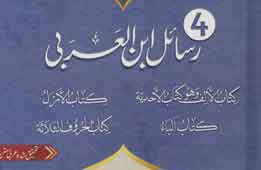
Rasail Ibn al Arabi – new editions
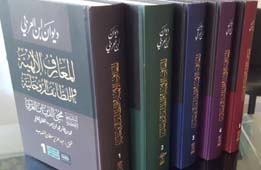
Critical Edition of Ibn ‘Arabi’s Diwān
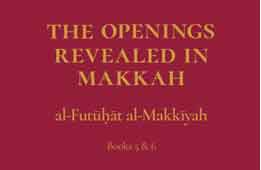
The Openings Revealed in Makkah
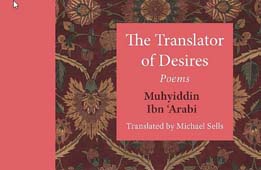
Translator of Desires – Michael Sells
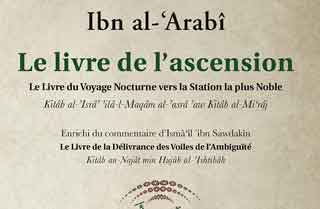
Ibn al-‘Arabî – Kıtâb al-’Isrâ
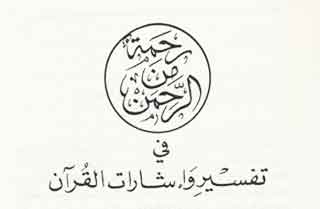
Shaykh Mahmud Ghurab

From Chapter 52 of the Futūhāt
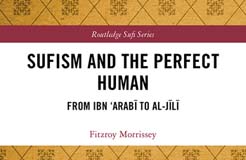
Sufism and the Perfect Human

Michel Chodkiewicz – A Legacy

Discovering Compassion
Reading Circles in MIAS Latina
Pablo Beneito

He has been studying the works of Ibn Arabi since he chose to do his doctorate in Arabic philology at the Complutense University of Madrid, after which he spent nine years teaching at the University of Seville in the Department of Arab and Islamic Studies. He has also been a visiting professor at the Sorbonne in Paris (Ecole Pratique des Hauts Etudes), in Kyoto University (ASAFAS) and in Toledo (Escuela de Traductores). As a specialist in Sufi thought, he has given courses throughout the world, and helped organise more than 14 international conferences. He heads MIAS Latina [/], an independent organisation affiliated to the Ibn Arabi Society, for speakers of Spanish, Italian and Portuguese.
He has edited and translated (into Spanish) Ibn Arabi’s Mashahid al-asrar and Kashf al-ma’na. He is currently working on several of Ibn Arabi’s shorter treatises, including Kitab al-Abadilah.
Together with Stephen Hirtenstein he translated The Seven Days of the Heart - Ibn ʿArabi's Awrad al-usbu (Wird), and togther with Cecilia Twinch, Contemplation of the Holy Mysteries - Mashahid al-asrar al-qudsiyya.
Articles by Pablo Beneito
On the Divine Love of Beauty (PDF)
The Presence of Superlative Compassion
La Presencia De La Compasión Superlativa (Spanish)
The Servant of the Loving One – On the Adoption of the Character Traits of al-Wadud
The Time of Deeds and the Time of Spiritual Knowledge
The Prayer of Blessing [upon the Light of Muhammad] by Abd al-Aziz al-Mahdawi: Part 1, the Introduction; with Stephen Hirtenstein
The Prayer of Blessing [upon the Light of Muhammad] by Abd al-Aziz al-Mahdawi: Part 2, the Translation; with Stephen Hirtenstein
Podcasts and Videos by Pablo Beneito
Qurrat al-‘Ayn: the Maiden of the Ka‘ba
Ibn Arabi’s Vision of the Multiple Oneness of the Inner Human Kingdom
Past and Future of Knowledge: the Time of Gnosis in Ibn Arabi’s Writings
On the Spiritual Typologies in Ibn Arabi’s Kitab al-Abadilah
A friend from Oxford contacted me, asking me to share my experience of what we in MIAS Latina call ‘Ibn Arabi Reading Circles’ (Círculos de Lectura Ibn Arabi). He knows that this has been a very enriching activity for us, and since he sent me a number of pertinent questions, I will proceed by answering them as though in an interview.
– Tell us about the experience of reading circles in MIAS Latina.
Among the activities (symposia, seminars, publications…) that the Society has developed, mainly in Spain, Portugal and Italy, but also in Latin America, MIAS Latina began the experience of reading groups in Murcia in 2015. Soon we had other circles joining the project, which currently include Barcelona, Ciudad Real, Granada, Lisbon, Tarragona/Reus, Talavera, Valencia and (soon to be opened) Bogota. Some have been going for a time, such as Mexico D.F. or Melilla, but are not active at the moment, since these Circles depend greatly on the availability and circumstances of those who organise them, in the place where they occur.
On the MIAS Latina website, the activity was presented in the following way:
‘The MIAS Latina Society proposes an activity, called Reading Circles, whose main purpose is to encourage those with an interest in learning more about Ibn ‘Arabi to become familiar with his work in a relaxed atmosphere of exchange among participants. The Circles’ activities are aimed at all interested parties (membership of the Society is not required). Our aim, therefore, is to promote a space for an open relationship between the participants that encourages an approach to the author and his works (through versions in Spanish, Portuguese or other local languages). Participation does not require any previous training, and the purpose of the reading is not academic. Like all MIAS Latina activities, the orientation of the reading sessions is secular and non-denominational, so that people of diverse beliefs and inclinations can participate in an inclusive way that may enrich us all with different perspectives. The dynamics of the meetings consist of sharing a space for reading the texts, previously selected by the local coordinators or by consensus of the group, for approximately an hour and a half. After reading each text, we exchange impressions and experiences in a climate of creative and responsive dialogue, open to a diversity of views and ideas’.
We suggest that meetings happen once a month, and sessions start and end with a few minutes of silence and intention, so that we may focus on the situation. In some groups which include musicians, they occasionally introduce or accompany the session with a musical moment of the ney or other instruments. Sometimes sessions are devoted to poetry or are introduced by the reading of a poem or a meaningful traditional story. One of the main intentions is to practise courtesy and respectful receptivity – it has to be clear to the participants that the purpose is not to solve the technical difficulties of the texts, but only to get familiar with a level of the text that is accessible to those present. It is more a question of an inspirational heart relationship, rather than an analytical approach, in order to avoid an over-intellectual point of view. We feel it is important to keep it simple. Every Circle will develop its activity in its own way, since it is a creative experience.
Normally the person reading the text will stop for a moment after a few paragraphs, and perhaps after some conversation another person will continue reading.
A significant number of people take part in the circles, and we get very positive feedback.
– How is it decided what to read?
The website of MIAS Latina provides some recommendations of books which might be suitable at the beginning of a circle’s activities. In Spanish for example, we suggest that people who are not yet familiar enough with him start reading about Ibn Arabi, or texts that include annotated translations, so that general books by such authors as Addas, Chittick or Fernando Mora would be first options before circles start reading a direct translation of Fusus or some other text by the master himself. In Murcia or Barcelona we are now reading Fusus in a Spanish version, but some among us check and comment eventually at the same time from the Arabic or versions in other languages. Every circle decides what and how to read, and the Society tries to keep communication alive between different circles, in order to achieve a certain harmony and resonance in what is being done.
– Is the group led by somebody? What input do they give?
One of the tasks of the coordinator/s is to find a proper place for the meetings. We recommend official spaces, or spaces provided by cultural institutions or associations, but any place providing a harmonious, open context is suitable. The coordinator/s takes care of the flow of communication and the rhythm and orientation of the sessions. So the person leading a group is not necessarily the one who is most familiar with Ibn ‘Arabi’s writings and teachings.
We have an activity called ‘Meetings of the Reading Circles’, which has had three meetings so far in Valencia and Murcia, whose intention is to bring together the participants and coordinators of the different circles in order to share our experience and harmonise our intentions. Those meetings include, among other things, short presentations in which speakers take part who are not necessarily ‘specialised’ in their fields of interest. It is a very enriching experience of sharing, and a fruitful context to reinforce the link among coordinators and participants in the circles.
Those interested in starting a reading circle somewhere may get in touch with us and we’ll help them to get familiar with MIAS activities.
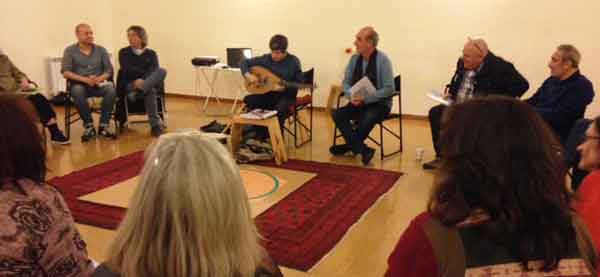
From a meeting of circles in 2018, with participants from circles in Murcia, Valencia, Barcelona. Photograph courtesy of Eloisa Torres.
– How many people are there in a reading circle?
It varies of course from place to place, but typically reading groups comprise 10 to 15 persons. There are also smaller groups. It should not matter, as long as there is room for both a certain fluidity and a certain familiarity. Some people are more constant while others only appear from time to time. So far, it is in general totally free, and there is not a general established commitment to attend, apart of course from the commitment of the person or persons (more recommended) who are responsible for the announcement and the dynamic of the situation. We have not found any difficulty with this flexibility, since the approach to the texts focuses on the immediate experience, and does not aim at specialised analysis. In certain Circles, as for example in Barcelona, a significant number of people already familiar with the writings of Ibn Arabi gather, while in other groups few people are really acquainted with them at a technical level, or only one, or even nobody. It does not seem essential because those sharing the experience of reading only aim to get familiar with the world of references his works provide, in resonance with the teachings of other masters from other traditions. The purpose is to generate and share a friendly, relaxed, receptive, open atmosphere. Every Circle would decide how open to be, whether to include more people, or to remain within more restricted in order to allow for more intimacy. As far as I know, Circles tend to remain open to all those who aim to join the activity, and quite naturally those who resonate with the activity will be part of it, and balance in the group is naturally achieved without worry or effort. Only a disposition towards receptivity and spiritual courtesy is needed, and people inclined to approach Ibn ‘Arabi have necessarily an interest in participating and developing a dynamic that focuses on listening. In this sense, number happens. There is no need in principle for a pre-established number to be fixed. A group in a big city that becomes too big, may feel the need to divide into smaller area groups. So be it.
– Have these always been face to face up to now? Have any of them worked through video or audio conferencing, or as email groups?
Yes, up to now the sessions of the Reading Circles have always been practiced as local/regional, face to face, heart to heart meetings. But since the Covid-19 restrictions on physical interaction came about, some of the Circles, like Talavera and Murcia, started a series of virtual video gatherings, following more or less the same previous pattern, but naturally open to the inclusion of others who might be in different areas or countries. It still feels like a face to face meeting in a way, even if images are digital, and benefits from the fact that physical distance is not an obstacle to attending. After this regional experience we decided to start an International Reading Circle, whose programme you can see in the news sectionof the MIAS Latina web site (Círculo de lectura internacional Ibn Arabi [/]). This allows communication among people connected to the Society and the different circles in the world. In this wider context, we benefit from the more personal presentations of scholars or persons that are more deeply connected to the study of Ibn ‘Arabi, so that sessions tend to include a proper talk followed by open sharing, rather than a direct reading of texts without presentation, as is most often the case in the sessions in regional circles.
Before that some circles, for example in México, also used video-conferencing as a way of receiving a speaker from somewhere else, such as Brazil or Spain.
The activities are announced on the MIAS Latina website (under Círculo de Lectura [/]), so that people can get in touch with the Circle, but normally those who take part of the gatherings communicate by telephone, mail or, very often, through servers such as Whatsapp or similar in order to develop a local forum.
Pablo Beneito
